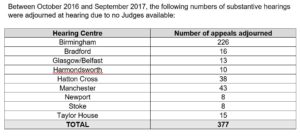Immigration Appeal Adjournments in the First-tier Immigration Tribunal
Although waiting times for an immigration appeal in the UK are currently very long, with an average of 12 months, there may be circumstances where an adjournment is necessary to allow further time to properly prepare an appeal. This is explored further in this article.
How will an application for an immigration appeal adjournment be considered?
As part of its general case management powers, the First-tier Tribunal (Immigration & Asylum Chamber) has the power to ‘adjourn or postpone a hearing’ (rule 4(3)(h).
There is no specific test that is applicable, but when exercising any power under the Rules, the Tribunal must seek to give effect to the overriding objective of dealing with cases ‘fairly and justly’. Doing so includes ‘avoiding delay, so far as compatible with proper consideration of the issues.’
In the case of Nwaigwe (adjournment: fairness) [2014] UKUT 00418 (IAC) (discussed in a previous blog post), the Upper Tribunal set out the importance of considering whether a refusal to accede to an adjournment request for an immigration appeal would deprive the affected party of his right to a fair hearing. The key issue is therefore, fairness, and if an adjournment refusal is unfair, this could amount to an error of law.
Further guidance is provided by Mr Michael Clements, the president of the First-tier Tribunal (IAC) in Presidential Guidance Note No 1 of 2014. This makes it clear that applications to adjourn immigration appeals should be considered on their own merits and all factors brought to the Tribunal’s attention must be examined.
How do I make an application for adjournment of an immigration appeal?
An application to adjourn an immigration appeal should be made by writing to the Tribunal (with a copy sent to the Respondent) at the earliest possible opportunity. It should be supported by reasons and relevant evidence. It should set out specific details of why the adjournment is needed in order to deal with the case fairly and justly, the earliest date the immigration appeal hearing can realistically take place, why the task that is necessary cannot be completed in the time available and why an adjournment will not prejudice the Respondent.
Some common circumstances in which an immigration appeal adjournment may be necessary and relevant issues to address in an adjournment application are set out below.
- Illness of the Appellant: Where the Appellant has suddenly fallen ill and will be unable to attend the hearing as a result, medical evidence should be provided. This should explain the nature of the illness, why this means the Appellant cannot attend the hearing, and when the Appellant will have sufficiently recovered to attend an appeal.
- Need for expert evidence: You should explain why the expert evidence is necessary to justly determine the appeal, set out the timeframe by which the report will be ready, steps already taken (if any) to instruct an expert, and the reasons why it could not have been prepared in the time available.
- Changes to the nature of the case: Where something has happened which has led to a material change in the nature of the case, or there are changes to the grounds of appeal or reasons for refusal, an adjournment may be required so this can be properly addressed. An adjournment application should address the evidence that may be sought.
What if the adjournment application is refused?
You should look carefully at the reasons given in the refusal decision, and consider whether these can be addressed by further evidence. If so, a new application should be made.
If your application for adjournment of your immigration appeal has not been successful prior to a listed hearing, you must attend the hearing. Failure to do so may lead to the appeal being heard and determined in your absence. You or your representative can renew the application for an adjournment orally on the day of the hearing. If this is refused, the appeal will proceed, so it is important that you prepare for the appeal on this basis.
If it is granted, parties should consider what further directions may be necessary to enable the hearing to proceed at the next hearing.
Immigration Appeal Adjournments by the Tribunal
Sometimes immigration appeals are adjourned on the Tribunal’s own motion due to a lack of judiciary or lack of court time.

Response to Freedom of Information Act request made by Richmond Chambers Immigration Barristers in January 2018
Another common circumstance in which the Tribunal may adjourn an immigration appeal is where the Home Office is not represented. However, in accordance with the Surendran guidelines, this will only be appropriate in the most exceptional circumstances.
Contact our Immigration Appeal Barristers
For advice and assistance with an immigration appeal, contact our immigration barristers in London on 0203 617 9173 or via our enquiry form.







